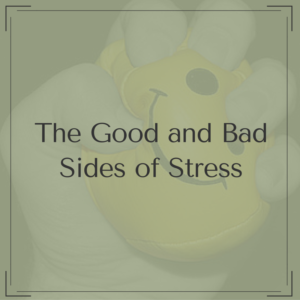 The word stress has taken a hit lately, usually being affiliated with health issues, cognitive and mental distress, even negative physical manifestations.
The word stress has taken a hit lately, usually being affiliated with health issues, cognitive and mental distress, even negative physical manifestations.
Truly, these connections to stress are all valid – and believe me, I was a victim of stress myself. I continue to counsel clients on managing stress at the workplace and in life in general. However, everyone has stress and it’s only fair to present how it can also be a benefit to you as much as it can be an obstacle to your own optimal health and well-being.
So let’s take a look at the two faces of stress.
We have stress as a response to situations as a throwback to the survival needs of our ancestors – the flight or fight response often kept them from being devoured by wild animals. Granted, we’re not likely to be eaten by a wolf anymore, but a similar response occurs when we’re under duress, and it does have its upside.
Brain Booster
Researchers at UC Berkeley have found that stress can “prime the brain” and that brief stressful events actually stimulated the brain stem cells to produce nerve cells to improve performance in rats. Another study from the University of Alabama suggested that the body’s response to stress can temporarily boost memory and learning scores.
The bad news: chronic or prolonged stress actually causes the suppression of stem cell production, generating fewer brain cells.
Immunity
Stress has not been aligned with improving health, but in small doses, researchers have found that the presence of stress triggers the body to defend itself against illness. Interleukins—chemicals that help regulate the immune system – are also produced at a higher rate to defend the body against disease.
The bad news: Chronic stress can lead to increased risk of coronary disease (40-50 percent!), tension headaches, overweight, nausea, and diarrhea – just for starters!
Resilience
You’ve heard the saying, “What doesn’t kill you makes you stronger.” Apparently the stress you encounter in a tough situation helps prepare you for the next. The idea again is small doses of moderate stress, which translate into a higher capability of dealing with stress in the future without shutting down mentally.
The bad news: repeated exposure to high-stress events (traumatic stress) can interrupt sleep, lead to nervous disorders and is what emergency responders, military veterans and others who encounter repeated traumatic events wrestle with (post-traumatic stress disorder).
Motivation
I’ll start this one off with a caveat: not everyone responds to stress – even small amounts of it – in the same way. However, when faced with a project that has a deadline, stress occurs, but if it’s received as a challenge you can face and achieve, it’s a motivator to get the job done. Researchers feel that these instances develop good stress that can actually help us focus in on the task at hand.
The bad news: repeated high-stress situations can end up leaving you feel overwhelmed, depressed and create a lower level of productivity and feelings of inability to cope.
Regardless of the type of stress, it’s smart to recognize it when we have it. The next response is to deal with it, negative or positive and do so with strategies that are easy and effective. Deep breathing, small exercises and more can tackle the stress at work or home comfortably. If figuring out how to get stress under control leads you to have even more stress, contact Empower Wellness to establish a plan to relieve and control how you deal with stress.

